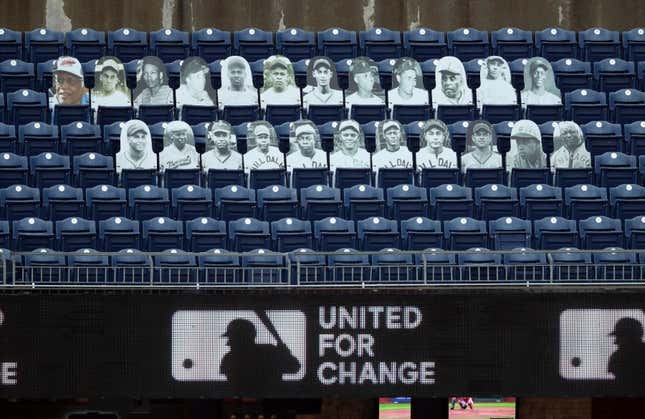
America sure seems to spend a lot of time correcting its history of racism and segregation by updating official records to reflect the 21st century. It’s a practice that tends to honor accomplished Black people posthumously with the recognition they should have been able to enjoy while they were alive. Still, it’s a welcome gesture, and the latest organization to come to glory on the fact that systemic racism caused a lot of notable Black people to go without proper recognition and acceptance is Major League Baseball.
On Wednesday, Commissioner Rob Manfred announced that MLB will elevate the Negro League to “Major League” status, meaning the statistics and records of 3,400 Black players across seven professional leagues that operated between 1920 and 1948 will be included in the official MLB database.
According to the Washington Post, 1948 is the cutoff year because by that year, Jackie Robinson, Larry Doby and other Black players had left the Negro Leagues after being signed by MLB teams. It was also the last year that the Negro World Series was played between the champions of the Negro National League and Negro American League.
“All of us who love baseball have long known that the Negro Leagues produced many of our game’s best players, innovations and triumphs against a backdrop of injustice,” Manfred said in a statement, according to MLB News. “We are now grateful to count the players of the Negro Leagues where they belong: as Major Leaguers within the official historical record.”
From MLB News:
The seven leagues are the Negro National League (I) (1920-31), the Eastern Colored League (1923-28), the American Negro League (1929), the East-West League (1932), the Negro Southern League (1932), the Negro National League (II) (1933-48) and the Negro American League (1937-48). Those leagues combined to produce 35 Hall of Famers, and the result of MLB’s decision is that Negro League legends such as Josh Gibson, Oscar Charleston and Cool Papa Bell have achieved the Major League status denied to them in their living years by the injustice of segregation.
The decision took into account discussions with the National Baseball Hall of Fame and Museum, a 2006 study by the Negro League Researchers and Authors Group and an expanding historical record of Negro League statistics, among other factors. In its announcement, MLB specifically commended historian Larry Lester, a co-founder of the Negro Leagues Baseball Museum in Kansas City, as well as Gary Ashwill, Scott Simkus, Mike Lynch and Kevin Johnson for their construction of Seamheads’ Negro Leagues Database, which has pieced together newspapers, scorebooks, photo albums and microfiche to provide the most complete statistical record of the Negro Leagues to date.
In 1969, MLB’s all-white Special Baseball Records Committee recognized six baseball leagues that weren’t included in Major League statistics but were worthy of being added to the record: The National League, American League, American Association, Union Association, Players’ League and Federal League. None of the Negro Leagues were even considered at the time. MLB acknowledged that racist oversight in its press release stating that “it is MLB’s view that the Committee’s 1969 omission of the Negro Leagues from consideration was clearly an error that demands today’s designation.”
“For historical merit, it is extraordinarily important,” Negro Leagues Baseball Museum President Bob Kendrick said, MLB News reports. “Having been around so many of the Negro League players, they never looked to Major League Baseball to validate them. But for fans and for historical sake, this is significant, it really is. So we are extremely pleased with this announcement. And for us, it does give additional credence to how significant the Negro Leagues were, both on and off the field.”

